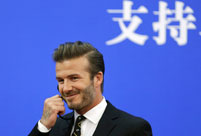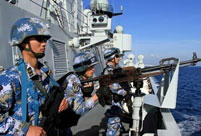 Luxury cars make Asia premiere at Auto China
Luxury cars make Asia premiere at Auto China
 Versatile dog
Versatile dog
 Ni Ni covers BAZAAR JEWELRY
Ni Ni covers BAZAAR JEWELRY
 Cherry blossoms reach peak bloom in Washington D.C.
Cherry blossoms reach peak bloom in Washington D.C.
 Top Chinese fashion icons in foreigners' eyes
Top Chinese fashion icons in foreigners' eyes
 Asia's largest business aviation exhibition to be held in Shanghai
Asia's largest business aviation exhibition to be held in Shanghai
 World's top-rated luxury hotels
World's top-rated luxury hotels
 Wu Jing, Xie Nan to hold wedding on May
Wu Jing, Xie Nan to hold wedding on May
 London Cake International attracts tourists
London Cake International attracts tourists
 Let's dance in harmonic Shaanxi
Let's dance in harmonic Shaanxi
History tells us that Japan is highly likely to relive its notorious militarist past if leaders like Abe are the helm. Japan's ambitions have been exposed by its attempts to blur its wartime crimes and create tensions with its neighbors. And Japan's move to "nationalize" China's Diaoyu Islands in 2012 is an apt example of its militarist designs. If the US chooses to turn a blind eye to Japan's provocative moves and keeps sending out confusing signals that Japan might take as an encouragement, Tokyo will become the destabilizing link in East Asia.
Therefore, as a country that exercises great influence on Japan and claims to safeguard peace and stability in the world, the US is obliged to take measures to drive some sense into Japanese right-wing forces instead of appearing to support their absurd policies. Even if its "rebalancing" to Asia strategy is aimed at consolidating its presence in the Asia-Pacific and containing China, the US should at least rebalance US-Japan relations to ensure that Tokyo doesn't undermine its strategy.
It is thus important that the US government abide by the following rules. First, it should stop encouraging Japan and "exploiting" its strategic value to contain China and other Asian countries. Second, the US should expose Japan's diplomatic double standard and take measures to stop its expansionist policy. Third, it should ensure that Japan uses its economic and technological advantages to contribute to, rather than thwart, the development of the region and the rest of the world.
By and large, Obama's visit to Asia, especially Japan, will have a great impact on the US' "rebalancing" to Asia strategy and the stability of East Asian. So it's time the US advised Japan to refrain from taking provocative actions against China and desisted from reaching an agreement with Japan that could jeopardize the security and stability of the Asia-Pacific region.
The author is a professor at Chinese People's Liberation Army University of International Relations.

 Beckham launches fund to support youth soccer in China
Beckham launches fund to support youth soccer in China Cherry blossoms hit peak bloom in Washington D.C.
Cherry blossoms hit peak bloom in Washington D.C. Children in ancient costumes learn Zhusuan
Children in ancient costumes learn Zhusuan Tens of thousands celebrate Water Splashing Festival
Tens of thousands celebrate Water Splashing Festival A bite of China II whets the appetite
A bite of China II whets the appetite Chinese frigate completes its 14th escort mission
Chinese frigate completes its 14th escort mission Let's dance in wealthy Shaanxi
Let's dance in wealthy Shaanxi A date with 798: feel the art around you
A date with 798: feel the art around you 3D-printed houses built in Shanghai
3D-printed houses built in Shanghai The backstage of the Fashion Week
The backstage of the Fashion Week College students in Han costumes
College students in Han costumes Postgraduate works as waitress
Postgraduate works as waitress Life in a Lahu village in Yunnan
Life in a Lahu village in Yunnan An orphan’s wedding
An orphan’s wedding Hollywood documentary brings Diaoyu Islands truth to new audience
Hollywood documentary brings Diaoyu Islands truth to new audienceDay|Week|Month